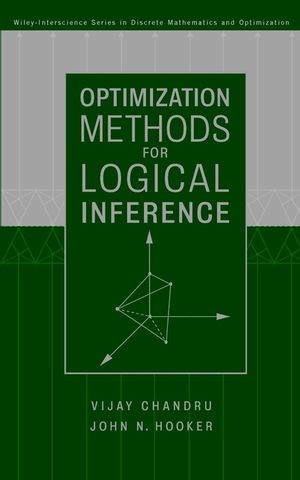Optimization Methods for Logical InferenceISBN: 978-0-471-57035-6
Hardcover
365 pages
March 1999
 This is a Print-on-Demand title. It will be printed specifically to fill your order. Please allow an additional 10-15 days delivery time. The book is not returnable.
|
||||||
Merging logic and mathematics in deductive inference-an innovative, cutting-edge approach.
Optimization methods for logical inference? Absolutely, say Vijay Chandru and John Hooker, two major contributors to this rapidly expanding field. And even though "solving logical inference problems with optimization methods may seem a bit like eating sauerkraut with chopsticks. . . it is the mathematical structure of a problem that determines whether an optimization model can help solve it, not the context in which the problem occurs."
Presenting powerful, proven optimization techniques for logic inference problems, Chandru and Hooker show how optimization models can be used not only to solve problems in artificial intelligence and mathematical programming, but also have tremendous application in complex systems in general. They survey most of the recent research from the past decade in logic/optimization interfaces, incorporate some of their own results, and emphasize the types of logic most receptive to optimization methods-propositional logic, first order predicate logic, probabilistic and related logics, logics that combine evidence such as Dempster-Shafer theory, rule systems with confidence factors, and constraint logic programming systems.
Requiring no background in logic and clearly explaining all topics from the ground up, Optimization Methods for Logical Inference is an invaluable guide for scientists and students in diverse fields, including operations research, computer science, artificial intelligence, decision support systems, and engineering.
Optimization methods for logical inference? Absolutely, say Vijay Chandru and John Hooker, two major contributors to this rapidly expanding field. And even though "solving logical inference problems with optimization methods may seem a bit like eating sauerkraut with chopsticks. . . it is the mathematical structure of a problem that determines whether an optimization model can help solve it, not the context in which the problem occurs."
Presenting powerful, proven optimization techniques for logic inference problems, Chandru and Hooker show how optimization models can be used not only to solve problems in artificial intelligence and mathematical programming, but also have tremendous application in complex systems in general. They survey most of the recent research from the past decade in logic/optimization interfaces, incorporate some of their own results, and emphasize the types of logic most receptive to optimization methods-propositional logic, first order predicate logic, probabilistic and related logics, logics that combine evidence such as Dempster-Shafer theory, rule systems with confidence factors, and constraint logic programming systems.
Requiring no background in logic and clearly explaining all topics from the ground up, Optimization Methods for Logical Inference is an invaluable guide for scientists and students in diverse fields, including operations research, computer science, artificial intelligence, decision support systems, and engineering.



